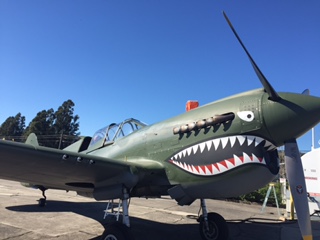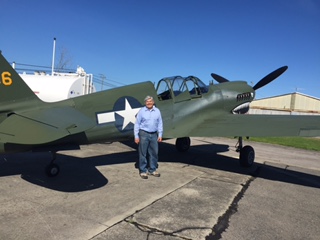 When he was a boy, Larry lived near a vacant lot with an the chassis of an old P40 airplane that he and the other boys played on, pretending to be pilots, fighting enemies. He grew up near Camp Pendleton in southern California, and war myths were part of his boyhood.
When he was a boy, Larry lived near a vacant lot with an the chassis of an old P40 airplane that he and the other boys played on, pretending to be pilots, fighting enemies. He grew up near Camp Pendleton in southern California, and war myths were part of his boyhood.
 So when he discovered a small airfield in Sonoma that has restored P40s with rides for hire, he decided to book a flight for his 75th birthday. We had to put it off several times because of rain, but finally went on a gorgeous sunny Saturday.
So when he discovered a small airfield in Sonoma that has restored P40s with rides for hire, he decided to book a flight for his 75th birthday. We had to put it off several times because of rain, but finally went on a gorgeous sunny Saturday.
He seemed to have a great time.
But today is Poetry Monday here, and this short poem by W. B. Yeats seems appropriate. For Larry, the P40 was a bit of nostalgia. For those flying in World War I, it was quite another thing.
An Irish Airman Foresees His Death
I know that I shall meet my fate
Somewhere among the clouds above;
Those that I fight I do not hate
Those that I guard I do not love;
My country is Kiltartan Cross,
My countrymen Kiltartan’s poor,
No likely end could bring them loss
Or leave them happier than before.
Nor law, nor duty bade me fight,
Nor public man, nor cheering crowds,
A lonely impulse of delight
Drove to this tumult in the clouds;
I balanced all, brought all to mind,
The years to come seemed waste of breath,
A waste of breath the years behind
In balance with this life, this death.
William Bultler Yeats
Correction, dear, that was WWI. Yeats died in 1939.
Fixed, thanks!
It is true that W B Yeats’s poem An Irish Airman Foresees His Death was written with WWII as Yeat’s reference point, it is also true that all of the poems emotions apply timelessly to any and all such situations. Can we not feel the emotions today from yesterday’s great poems?
As to the Curtis P-40 it was a mainstay of the WWII Allied effort.
correction: (written with WWI as Yeat’s reference point)
Bob, Larry corrected me–Yeats was referring to flyers in WWI–but your point still applies.